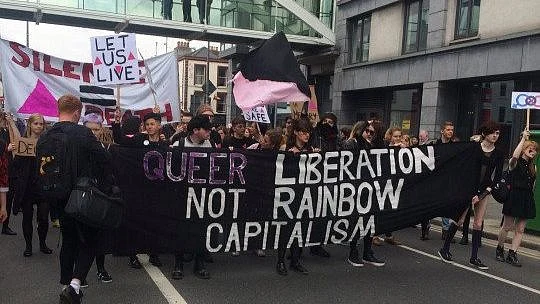In a landmark judgement last year, the Supreme Court decriminalised consensual gay sex. Corporations across the world were quick to hop on to the rainbow-coloured bandwagon and demonstrate their solidarity with the LGBTQIA+ community... by incorporating the Pride flag in their display pictures and brand logos on their social media platforms and with them, quirky taglines.
Here are some examples:
Similarly, through Pride Month, various companies openly supported the community and proclaimed themselves queer allies in Pride-themed advertisements.
While this may be overtly optimistic, we mustn’t confuse brands’ excellent social marketing skills with them being allies. Sure, they deserve to be commended for their work and can be given the benefit of the doubt as being one with the community, but with caution, as it is equally possible for brands to hinge their advertising content on socially relevant issues and portray themselves as ‘progressive’.
The phenomenon is new to India but has existed in the western for decades, and is known as ‘Pink Washing’ or ‘Rainbow Capitalism’.
‘Rainbow Capitalism’ can be understood as corporations’ belief that they can contribute towards the welfare of the LGBTQIA+ community by displaying the Pride flag. The effort remains limited to incorporating the rainbow and doesn’t go beyond the surface.
While these gestures help to integrate the LGBTQIA+ community into the mainstream, they cannot be considered activism, which demands voices of the marginalised to be heard.
Had corporations’ purpose been to publicly support the queer movement, wouldn’t they have been present during years of stigmatisation and discrimination?
Moreover, their superficial campaigning creates a facade of acceptance and leaves little scope for the status quo to be questioned.
True Support or a Marketing Gimmick?
These advertisements usually represent the upper middle class, a privileged section of society and are therefore, rooted to elitism. The scope of intersectional representation is little, and caste and class politics within the community are rarely addressed. These corporations do not help to continue the conversation on ground.
Even if we were to talk about merchandise used by the privileged – for instance, high-end clothing – we can see how these brands reinforce the gender binary by not providing fitting rooms for trans people or for gender non-conforming people. Yet, these clothing brands are often the first to come up with Pride merchandise.
Do These Campaigns Reach the Ground?
Rather flamboyant social media campaigning is done by companies, but sometimes, it does not translate on ground or bring about any real change.
If these companies want to go beyond the rainbow, they must ensure that they support relevant causes which affect the community. One such cause is the issue of hostile and discriminatory work environments.
Putting an end to workspace discrimination on grounds of a person’s gender identity/expression or sexual orientation isn’t an overnight job. However, there are various ways to sensitise employees to encourage a safe and accepting workspace.
Revoking an archaic law won’t change the beliefs that people have internalised in all the years of the community being discriminated against.
How Can the Workspace Be Made More Inclusive?
1. Gender-Neutral Restrooms
The first step towards inclusivity would be to have restrooms which are gender neutral. This would make offices more accommodating of gender non-conforming people and transgender people.
2. Sensitising the Staff
Homophobia often stems out of ignorance, and therefore, efforts must be made to educate the staff about queer-specific issues and the usage of correct terminology. This will enable them to treat everybody in an equal and fair manner.
3. Strict Anti-Discriminatory Policy
Where sensitisation fails, strict policies against discrimination come to the rescue. Discrimination in the form of violence, hostility and even derogatory remarks must be prohibited.
As an ally, we must make informed decisions and not blindly feed into capitalism.
I acknowledge that all of these marketing campaigns have definitely helped to accelerate the process of acceptance and subvert homophobia. They have also served as reminders of the years of struggle, demonstrations and protests that actively fought bigotry and homophobia – which still exist, despite widespread LGBTQIA+ acceptance.
However, the companies which put up rainbow-coloured logos on their social media platforms might be allowing homophobia in their workspace and go against the progressive values they openly endorse.
I urge you to think critically and not take these campaigns at face value. And if you are in the position to make or even influence a change, keep in mind the values to which the movement subscribes.
